Jack Postma sat at the Spectrum Health Bone Marrow Transplant Center on a recent weekday, as an infusion of platelets flowed into his body.
Each drip from the IV bag brings the hope of a longer life for Postma, who has battled through four cancers and two stem cell transplants in recent years.
First diagnosed with prostate cancer in 2010, the malignant bully has been a constant visitor in the retired high school principal’s life.
After prostate surgery in May of that year, all was well. Or so he thought.
Until June of 2011, when he started experiencing night sweats.
“If I would get a mosquito bite, it would swell right up,” Postma said.
Speaking at Unity Christian High School’s graduation ceremony that year, his voice squeaked.
“I made a joke about ‘the older you get, the younger you sound,’” Postma said. “People laughed.”
The lighthearted jokes ended a month later when an ultrasound revealed the reason for his faltering voice.
“My throat where the lymph nodes are underneath my jaw looked like I was growing small bananas,” Postma said.
Doctors thought an infection may be looming.
Tests revealed something worse
A CT scan showed all the lymph nodes in his body, approximately 600 of them, were enlarged. A biopsy unveiled the culprit—chronic lymphocytic leukemia, a cancer of the blood and bone marrow.
The good news? Doctors could treat the cancer. The bad news? They couldn’t cure it.
He started a two and a half year chemo journey.
“I think within a month the chemo brought the lymph nodes back to normal size,” he said.
With the fragility of life staring him down, Postma retired from his principal post in June 2012, after three decades on the job.
A few months later, two days after his chemotherapy treatments ended, more symptoms surfaced.
“I noticed my eyes were starting to bulge out of my head,” Postma said. “My eyelashes were brushing against my glasses.”
Alan Campbell, MD, a Spectrum Health oncologist and hematolotist, ordered a biopsy. The test results revealed yet another cancer bully, this time, mantle cell lymphoma.
“The tumor was growing between my brain and eyes and pushing my eyes out of my head,” Postma said. “Dr. Campbell said, ‘Jack, mantle cell lymphoma is the rarest form of lymphoma that there is. It’s unheard of that someone with chronic lymphocytic leukemia develops mantle cell.”
The improbable diagnosis became a life-altering diagnosis.
“Dr. Campbell said, ‘We’re going to do our best to eradicate it and give you some more time,’” Postma said. “’It’s just a matter of giving you some more time.’”
Time. It’s what life is made of. And Postma knew then, as he knows now, it’s best to make the most of those moments.
He underwent intense chemotherapy for the mantle cell leukemia from January 2013 until the end of May.
Headed for transplant
Stephanie Williams, MD, division chief of the adult blood and bone marrow transplant program, offered a glimmer of hope.
“Dr. Williams thought I might be a candidate for a stem cell transplant,” Postma said. “In May and early June of 2013 I went through all the physical tests to see if I was in shape for a stem cell transplant. I was.”
Instead of seeking stem cells from a donor, Postma received shots to stimulate his body to produce more stem cells. Dr. Williams harvested them on July 23, 2013, and infused them on July 30.
Postma’s body appeared to be accepting the transplant as he visited Dr. Campbell’s office every two months.
He felt good and felt encouraged. A year rolled by. Then two, three and four.
But 50 months after transplant, the bully raised its fist again. Postma’s counts started dipping.
A bone marrow biopsy revealed abnormalities in his blood and he was diagnosed with myeloid dysplesia, a condition in which bone marrow produces immature blood cells—an early form of leukemia.
Once again, like the student who can’t seem to stay out of the principal’s office, Postma returned to the infusion room for chemotherapy while Dr. Campbell and Dr. Williams set the course for another bone marrow transplant. This time, he needed a donor.
The question? “How many siblings do you have?”
Fortunately for Postma, seven. All younger.
“Two of my sisters were perfect matches,” Postma said.
The bone marrow clinic selected one of the sisters and conducted a physical. She passed.
“On January 2, 2018, Postma entered the hospital for seven days of intense chemotherapy to kill his immune system so it would be less likely to reject the new stem cells.
The Spectrum Health bone marrow transplant center harvested his sister’s cells on January 9. Later that evening, Dr. Williams infused the cells into his body.
“Since then it’s been a slow recovery to allow the stem cells to graft and begin producing,” he said.
He takes anti-rejection drugs daily, but in his mind he’s not rejecting reality. His life teeters in the balance.
He wants to follow in his mom’s footsteps, and walk his journey with faith.
“My mother had cancer when she was 39 and I was 14,” he said.
He never saw fear in his mom. He only saw trust. She lived to be 86. He wishes the same for the remainder of his life.
Despite four cancers and two transplants, he still believes.
“At no time did I have any fear,” Postma said, recalling his reaction to his diagnosis. “It was ‘OK, what are we going to do with it?’”
Postma decided what he wanted to do with it—use whatever time he has left to mentor and encourage others.
In a sense, perhaps he can beat the bully down, by building others up.
He coaches young principals.
“I visit them once a week and observe them in action,” Postma said. “I coach them on everything from staff meetings to board meetings. I volunteer, I’m not a consultant. It’s been very special. They’re all young, in their first, second or third year.”
When he’s not coaching, he’s watching reflections in the water while fishing with his grandson. Or, he’s reflecting on his own life—marrying his sweetheart Eleanor, whom he met years ago at Calvin College, getting drafted in the Army and spending years at the helm of high schools.
He thrives on watching his grandchildren participate in sports. Because of his immune system, he sits high in the bleachers, away from the crowd. He wears a yellow mask to block out germs. But he cheers through it, just as he continues to cheer life, even though he knows his gift of life may be temporary.
“With the donor stem cells, they said, ‘We’re looking to give you some more time and I don’t ask for anymore,’” Postma said. “That’s all any of us have. Therefore, you live every day to the fullest you can and try your best to be an encourager to others—encourage them in their faith and in their vocation.”
That’s the legacy he wishes to leave. A positive one.
“A couple of years ago I came across research that indicated human beings really latch onto negative statements,” Postma said. “Our brain is like Velcro. It just kind of sticks. Positive comments blow right on through unless you savor them for 15 seconds. By then, you imprint it on your neurons.”
It’s also important to use the words “appreciate” and “admire,” according to Postma.
“As a high school principal, I always learned to use the words ‘this is what I appreciate and this is what I admire,’” he said. “Otherwise, ‘appreciate’ can be a cliché word. Once you use ‘admire,’ it adds a depth to it.”
Postma deeply appreciates and admires Dr. Campbell and Dr. Williams.
Although Dr. Williams said Postma’s prognosis is “too early to tell,” she said he’s doing well.
“Hopefully we are going to give him more time,” Dr. Williams said. “That’s always the goal when we treat patients with cancer.”
It’s a bit unusual for one person to battle so many different cancers, according to Dr. Williams, but Postma has weathered the war well.
“He’s a great guy,” Dr. Williams said. “He is a very positive person. He’s a remarkable man.”
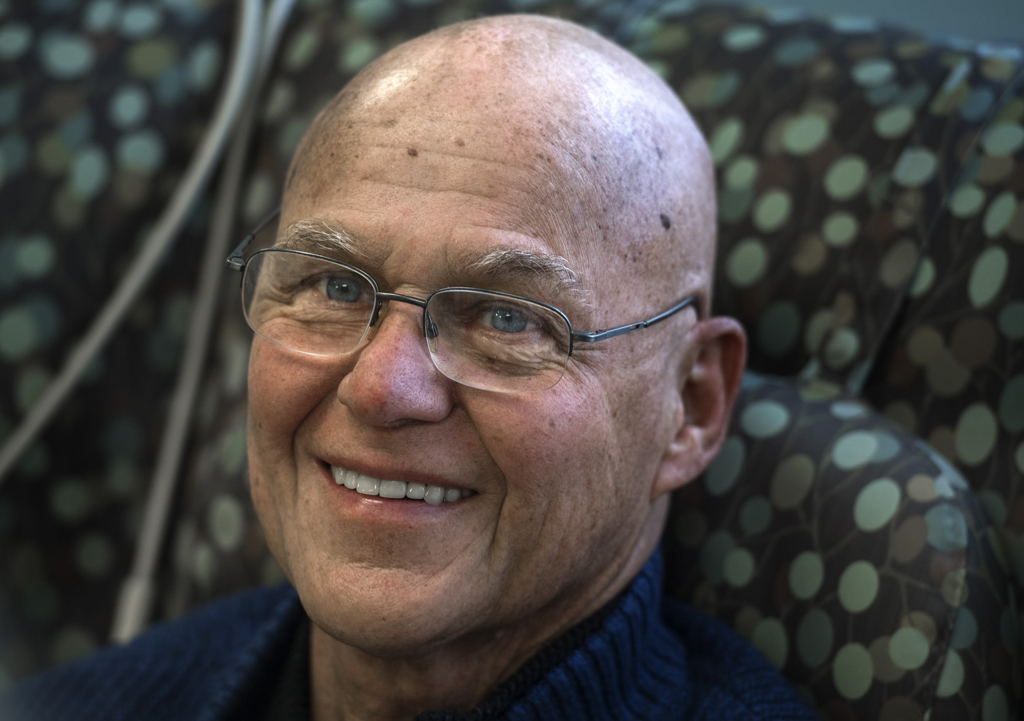
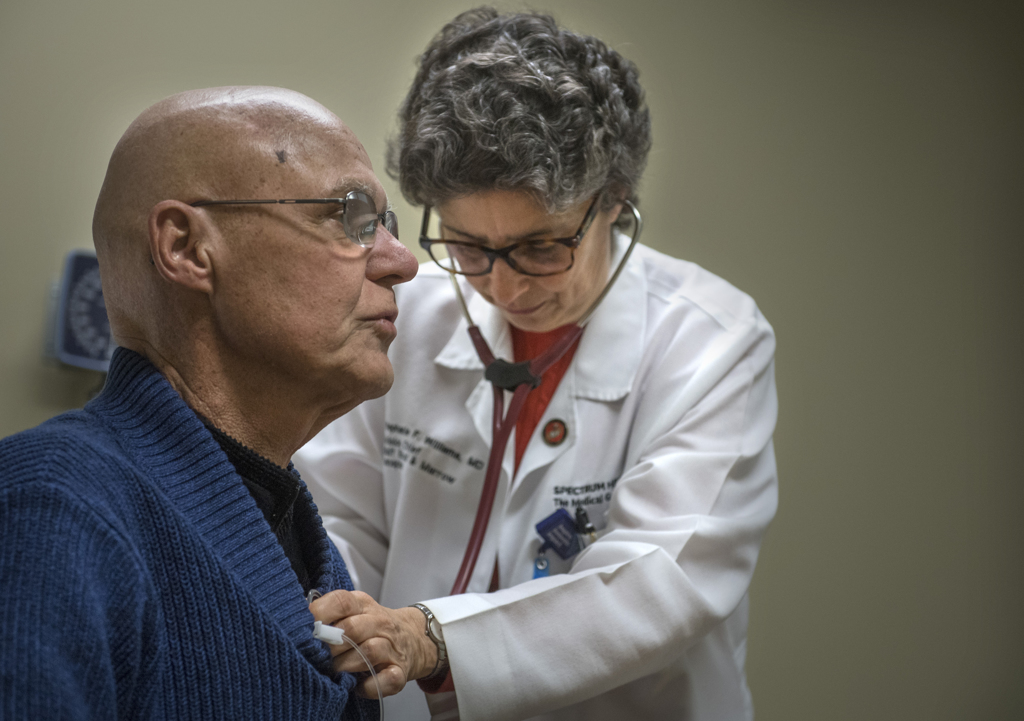
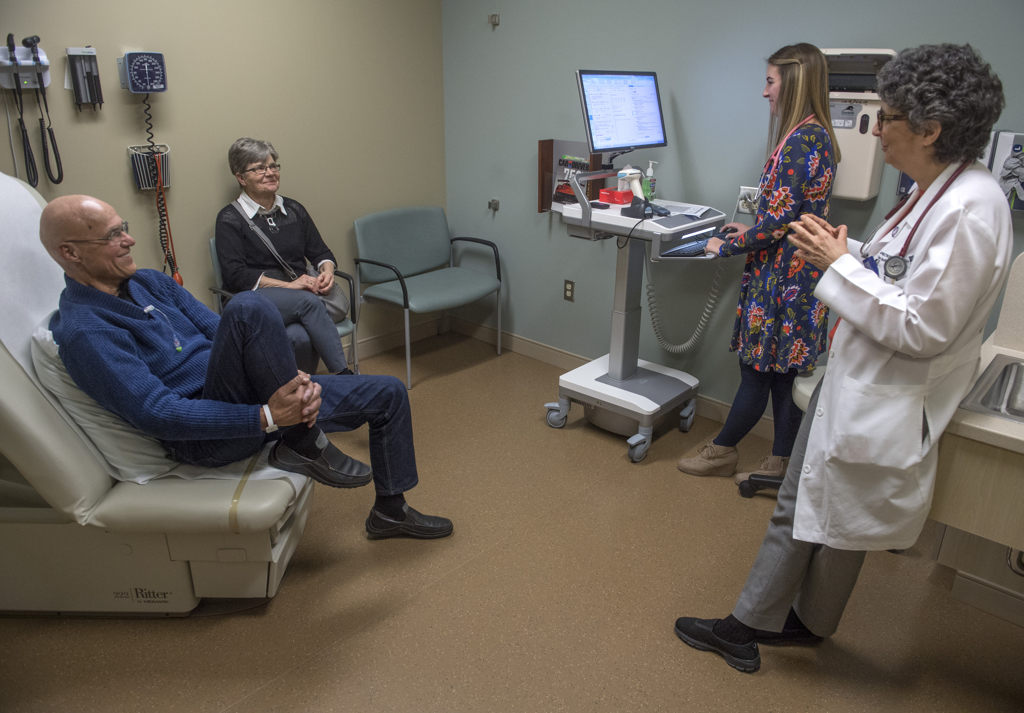
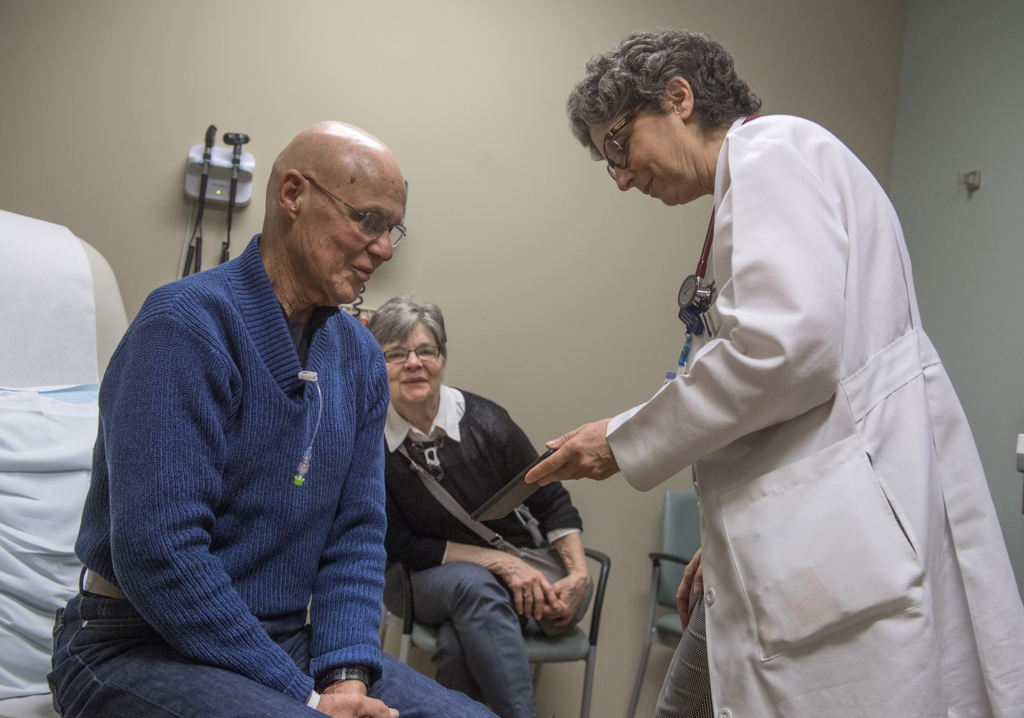
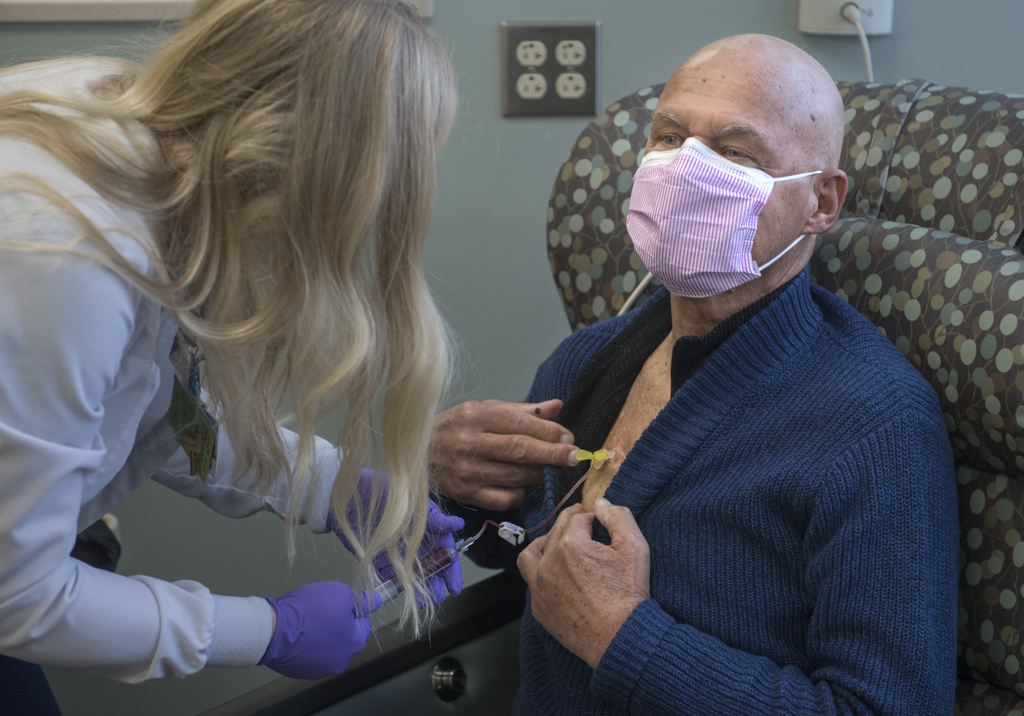
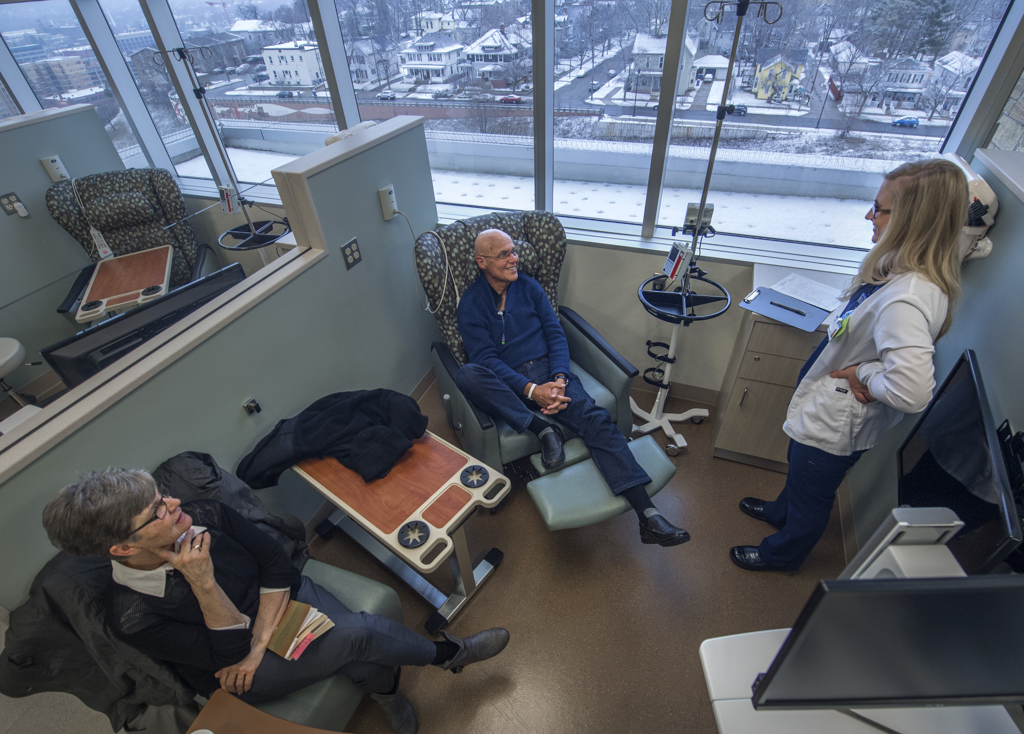
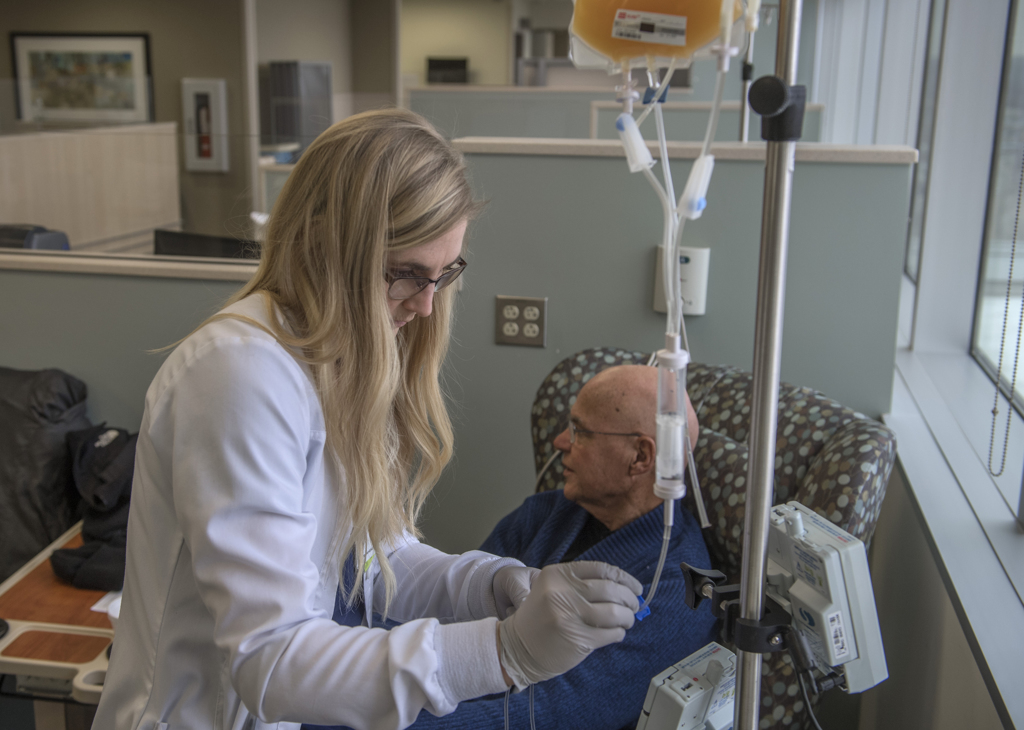
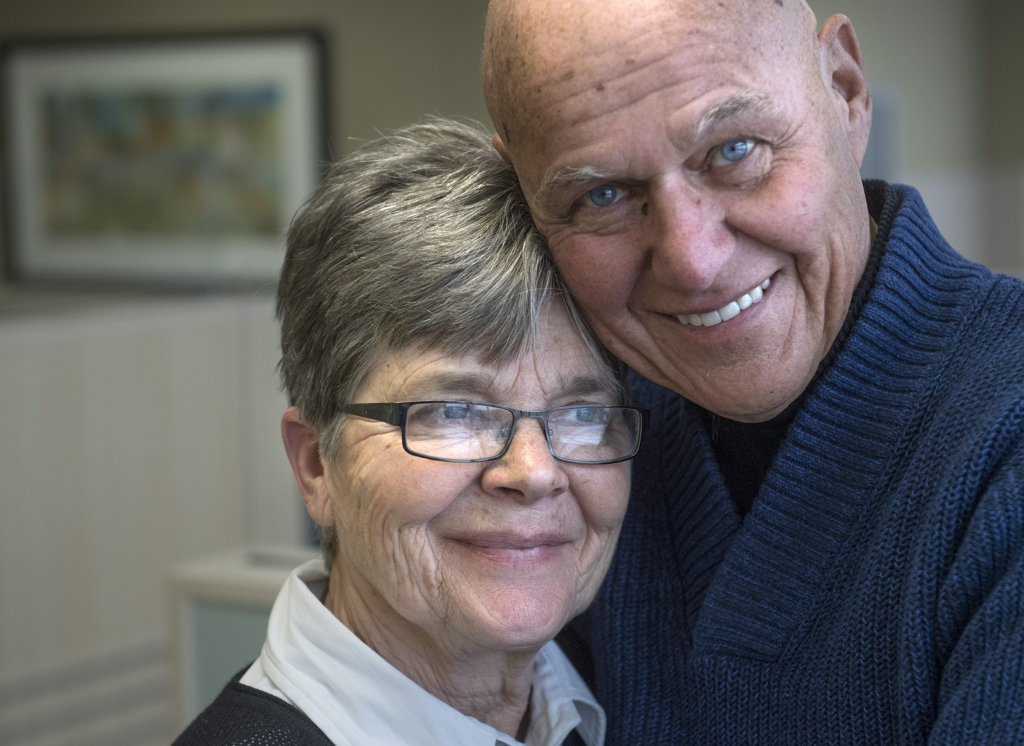
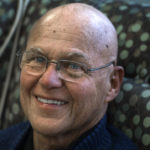


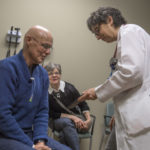
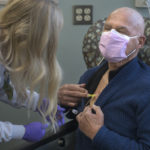
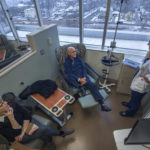
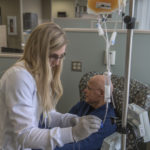


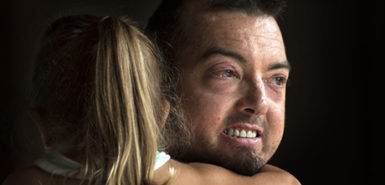 /a>
/a>
 /a>
/a>
 /a>
/a>
Thank you for sharing your story, Jack, We both now have had stories done on us from Health Beat!
I thoroughly enjoyed reading about your brother Rena . He is a true inspiration to me who has thus far one episode with a cancer battle . His constant faith in his Lord , which never wavers , brings God the glory through every new trial he faces ! I always trust two of my favorite Bible verses….Psalm 62:5-8 and Philippians 4:13 .
Mr. Postma,
What a wonderful story of faith and hope in your Lord and savior Jesus Christ. As you continue on this journey, we will be keeping you in prayer. We pray that your story would continue to reach many. Blessing to you and your family!
Yes, Jack is a remarkable, positive man. Always encouraging, always seeing the good in every situation, and SO helpful to all he mentors and who serve with him. I was on the board with Jack a few years and am forever thankful for that time.
Praying for you Jack; hope to see you around sometime!
Ralph
Jack is the type of guy that was amazing at baseline, and then grew to be even more influential, admirable and spiritual as he faced more adversity. I don’t know if many like him exist. A true pleasure to have as a part of my life!
Jack, we are praying for you. I have had a sign on my kitchen counter since 2000 when I first got cancer. I BELIEVE IN MIRACLES!!! H & J Leep
I am one of the principals that Jack coaches. His relationship and mentorship has meant the world to me. God promises that He will give you what you need when you need it. I needed Jack. He came at a time when I was at a professional low point in my life. Our school is thriving due in large part to his leading – his leading of me. He is patient with me when it’s appropriate to be patient and impatient when it’s appropriate to be impatient. Jack naturally provides a balance of empathy – knowing first hand that the position is a challenge – and a “you’ve got to do what it takes to get the job done well” mentality. Any time he challenges me in a behavior, attitude, or ineffective practice, I know it is because he truly cares about me. I thank God for providing Jack 2nd, 3rd and 4th chances in life. It has been a life-changing blessing to me.
Hi Jack…I had no idea you were going through all of this…you are an amazing person and just reading this has given me new strength. I remember you telling me that I was so positive for someone who had MS. Yes I have tried to be but along the way fears have cropped in. I think it’s amazing you have no fear….that’s an inspiration for me. I’ve had pneumonia this week and am weak but reading this gives me hope. I will pray for you and Eleanor every day and ask God to give you many more “times” with your kids and grandkids and many more moments to help others and if and when the time comes that we must leave…we know a crown awaits us and we will be whole again 🙏👆💪🏃💃
Jack – I usually do not check on these regularly posted hospital stories. But I think the Spirit wanted me to read your story, and I’m grateful for that leading.
I did not know you’ve been going through this long journey of “bullying.” It makes my own fairly minor in comparison.
And what a wonderful ministry of passing on your leadership in Christian education to future leaders.
Peace and grace, Jack.
I echo Phil. Jack Postma is an amazing man, and he has guided me tremendously as a principal and Christian. His encouragement comes as a true gift from God! His wisdom is beyond description, as well as his humility and humor! God knew we needed Jack tremendously, and Jack’s work and impact on this Earth is beyond description. Thanks Jack, and Elenor for supporting him in these challenges. She’s the angel that keeps him smiling! Thanks really isn’t big enough, but there aren’t any other words that describe his work for the Lord!
Sincerely,
Paula DeRoos